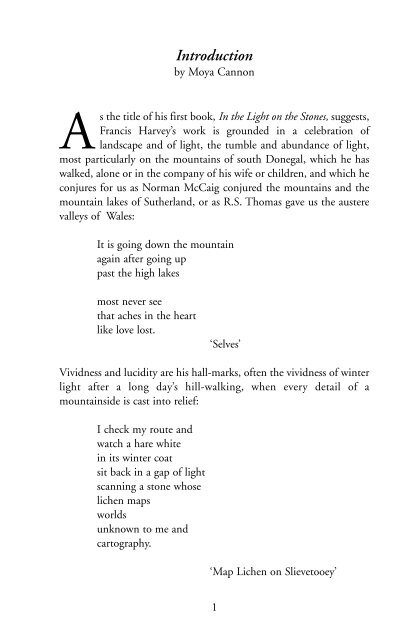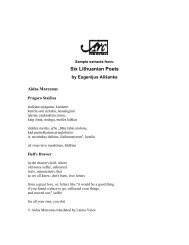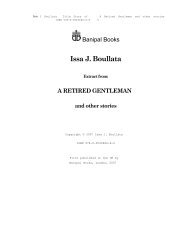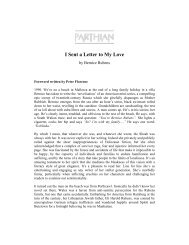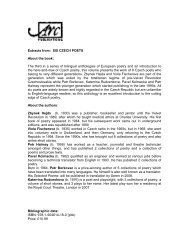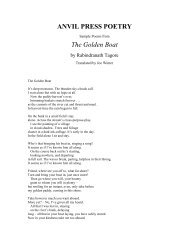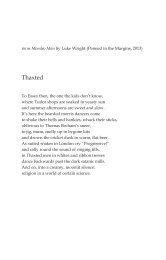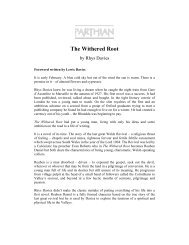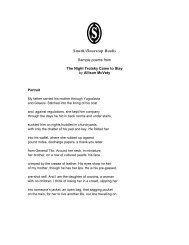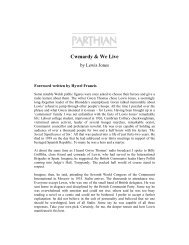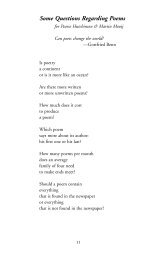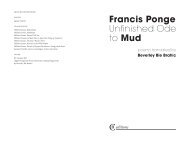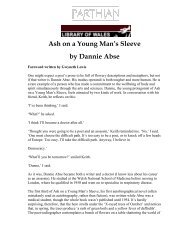Francis Harvey Collected Poems - Inpress Books
Francis Harvey Collected Poems - Inpress Books
Francis Harvey Collected Poems - Inpress Books
Create successful ePaper yourself
Turn your PDF publications into a flip-book with our unique Google optimized e-Paper software.
Introduction<br />
by Moya Cannon<br />
As the title of his first book, In the Light on the Stones, suggests,<br />
<strong>Francis</strong> <strong>Harvey</strong>’s work is grounded in a celebration of<br />
landscape and of light, the tumble and abundance of light,<br />
most particularly on the mountains of south Donegal, which he has<br />
walked, alone or in the company of his wife or children, and which he<br />
conjures for us as Norman McCaig conjured the mountains and the<br />
mountain lakes of Sutherland, or as R.S. Thomas gave us the austere<br />
valleys of Wales:<br />
It is going down the mountain<br />
again after going up<br />
past the high lakes<br />
most never see<br />
that aches in the heart<br />
like love lost.<br />
‘Selves’<br />
Vividness and lucidity are his hall-marks, often the vividness of winter<br />
light after a long day’s hill-walking, when every detail of a<br />
mountainside is cast into relief:<br />
I check my route and<br />
watch a hare white<br />
in its winter coat<br />
sit back in a gap of light<br />
scanning a stone whose<br />
lichen maps<br />
worlds<br />
unknown to me and<br />
cartography.<br />
‘Map Lichen on Slievetooey’<br />
1
A haiku-like combination of attention and playfulness throughout,<br />
reminiscent of the hare’s own darts and shifts of direction, serves to<br />
animate the work. Odd juxtapositions alert us, as in ‘Hail and<br />
Farewell’, where he writes of the birth of a bull-calf — “all sea-legs after<br />
nine months afloat…” and of the death of his mother’s brother on the<br />
same day:<br />
And me listening to him<br />
grinding out the last sounds he’d ever make<br />
in this world from the depths of his throat like stones<br />
scraping the keel as Charon launched his boat.<br />
The power of this work derives, largely, from a perfect marriage of<br />
imagery and rhythm, as the mysterious emotive energies of assonance<br />
and onomatopoeia are brought into play and rhyme is allowed to<br />
hammer the heart open:<br />
Something utterly true to itself, a stone being a stone,<br />
is plunging into its shadow and the mouse’s flesh and bone<br />
‘Kestrel’<br />
The rendered beauty of the landscapes which he sees with a painter’s<br />
eye is all the more convincing because he does not flinch from the<br />
harshness of the granite landscapes or from the material poverty of the<br />
lives lived by the sheep farmers who cling to them. Some of his bestknown<br />
and best-loved poems constitute a group of elegies for the<br />
solitary old people who lived in the mountain valleys of south<br />
Donegal, the people who, like ‘The Last Drover’, “left no deeds or<br />
songs at all”. Only someone of <strong>Harvey</strong>’s compassion could reconstruct,<br />
out of this very absence, the essence of the humanity of these men and<br />
women. This he does without either sentimentality or a pity which<br />
could be read as patronization. He affords these survivors of decayed<br />
communities the dignity of understated tragedy. He shows how they<br />
were, literally, bonded to their land, as in ‘The Death of Thady’ —<br />
He could not tell you why,<br />
he loves the place so much – and<br />
love’s a word he would never use…..<br />
2
or in ‘The Deaf Woman in the Glen’ —<br />
…she is<br />
locked in this<br />
landscape’s fierce<br />
embrace as<br />
the badger is whose<br />
unappeasable jaws only<br />
death unlocks from<br />
the throat of rabbit<br />
or rat and<br />
moves, free yet<br />
tethered,<br />
through<br />
time’s inexorable weathers.<br />
This compassion is also manifest in the many poems which refer,<br />
directly or indirectly, to the northern troubles. Born in Enniskillen to<br />
a Presbyterian father, who died when <strong>Harvey</strong> was six years old, and to<br />
a Catholic mother, he was better placed than most to experience and<br />
articulate the pain of both communities.<br />
Loyal Iniskilling or<br />
Inis Ceithleann, fierce<br />
Ceithleann’s island,<br />
forged me true.<br />
‘Mixed Marriage’<br />
One would be tempted to say that <strong>Francis</strong> <strong>Harvey</strong>’s work combines the<br />
passion for precision of a naturalist and the yearning for grace of a poet,<br />
except for the fact that a passion for precision, for naming, is also part of the<br />
bedrock of poetry. In the later poems there is a vivid sense of how we are all<br />
moving, “free but tethered, through time’s inexorable weathers.” In the<br />
context of Irish poetry, <strong>Francis</strong> <strong>Harvey</strong> is a Basho-like figure, guided by an<br />
unwavering sense of true north, always moving to the washed light on<br />
higher ground.<br />
3
Beachcombings<br />
SCULPTORS<br />
In memory of Con O’Mullane<br />
It sits on my desk being nothing but what<br />
I know it to be: a perfection of form.<br />
The stone that we found washed up on the shore<br />
at Enniscrone more than fifty years ago.<br />
Smooth as flesh stretched over bone and shaped<br />
so sensuously by the sea I can’t keep<br />
my hands off it each time it catches my eye.<br />
Like that Brancusi we saw in London once<br />
and kept on wanting to touch and touch and touch.<br />
LOOKING DOWN AT THE SKY<br />
Look at that mad stargazer studying<br />
astronomy by looking at the sand<br />
where the receding tide’s left a single<br />
starfish and added a tail to each one<br />
of the countless tiny shells embedded<br />
like comets in the sky on the strand.<br />
A BRIEF HISTORY OF TIME<br />
That time I followed the arrows a bird<br />
had inscribed on the sand with its feet<br />
was the time I realised the arrow<br />
of time was the time I wasted following<br />
what was pointing me forward by leading me back.<br />
141
SANDHOPPERS<br />
A cloudless blue sky and the patter<br />
of raindrops that, no matter<br />
how long they fall, will never wet a single one<br />
of these windrows of seaweed drying in the sun.<br />
THE CRYPTOGRAPHERS<br />
When it’s not drawing circles and half circles,<br />
what the marram grass inscribes on the sand<br />
with the fine point of its rusting nib is<br />
as enigmatic as the cryptograms<br />
these flocks of waders have printed with their feet.<br />
CHINOISERIE<br />
The eyes of the girl with the pigtail<br />
in the coolie hat on an Irish beach<br />
among the tiny pagodas of sea sandwort<br />
go suddenly Chinese in the sun’s glare<br />
as she places the willow-patterned dish<br />
of picnic sandwiches<br />
on the reed mat made in Hong Kong.<br />
THE TIRELESS SEAMSTRESS<br />
The incoming tide that unstitches<br />
the seams and irons out<br />
the tucks and pleats<br />
in this beach’s cloth-of-gold<br />
will shortly recede and leave<br />
144
new seams, tucks and pleats, holes<br />
in the cloth-of-gold<br />
for the next incoming tide<br />
to unstitch, iron out, darn,<br />
on and on ad infinitum.<br />
WALKIES AND TALKIES<br />
The ringed plover, dashing about the beach<br />
in spurts of manic energy,<br />
seems intent on showing me<br />
and the dog how frantically<br />
it’s been rehearsing for its role<br />
in the next early Chaplin movie<br />
until the dog decides to become<br />
a barker for the talkies<br />
and the plover goes walkies<br />
in a way that would not be possible<br />
for Chaplin or the dog or me.<br />
BLUEBELLS<br />
June and, as I was caught out<br />
telling a lie to you,<br />
a shimmer of blue and green<br />
on a grassy islet<br />
in Loughros Beg Bay<br />
was striving unsuccessfully<br />
to counterfeit aquamarine.<br />
145
Corrie<br />
They say it happened a long time ago<br />
when the glaciers were on the move<br />
like the circus from town to town<br />
and littered the landscape with rocks<br />
and scooped out holes in the ground<br />
and even left this dent in the hat of the clown.<br />
Animal Husbandry<br />
John has a few acres of bog and rock.<br />
Mostly rock. His two cows are always breaking<br />
out to go roaming for sweeter grass.<br />
When I told him that limpets graze on rocks<br />
and that their grazing range was three feet<br />
he said maybe he should be taking his cows<br />
to the limpet instead of to the bull.<br />
195


